The Intel Core i7-8086K Review
by Ian Cutress on June 11, 2018 8:00 AM EST- Posted in
- CPUs
- Intel
- Core i7
- Anniversary
- Coffee Lake
- i7-8086K
- 5 GHz
- 8086K
- 5.0 GHz
Benchmarking Performance: CPU Encoding Tests
One of the interesting elements on modern processors is encoding performance. This includes encryption/decryption, as well as video transcoding from one video format to another. In the encrypt/decrypt scenario, this remains pertinent to on-the-fly encryption of sensitive data - a process by which more modern devices are leaning to for software security. Video transcoding as a tool to adjust the quality, file size and resolution of a video file has boomed in recent years, such as providing the optimum video for devices before consumption, or for game streamers who are wanting to upload the output from their video camera in real-time. As we move into live 3D video, this task will only get more strenuous, and it turns out that the performance of certain algorithms is a function of the input/output of the content.
All of our benchmark results can also be found in our benchmark engine, Bench.
7-Zip 9.2
One of the freeware compression tools that offers good scaling performance between processors is 7-Zip. It runs under an open-source licence, is fast, and easy to use tool for power users. We run the benchmark mode via the command line for four loops and take the output score.
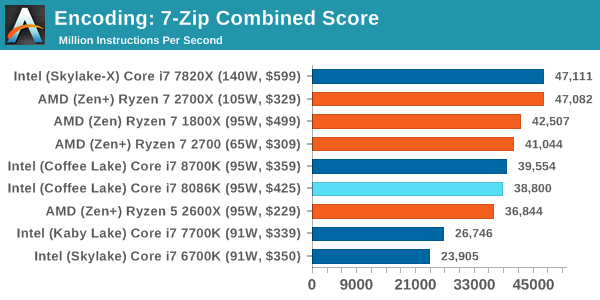
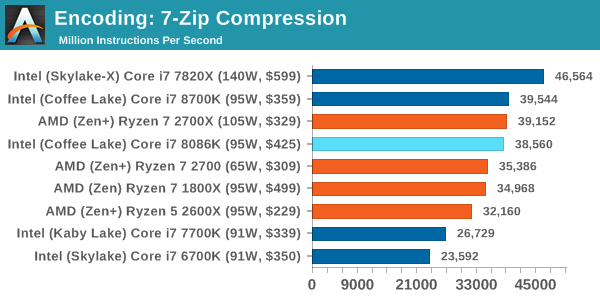
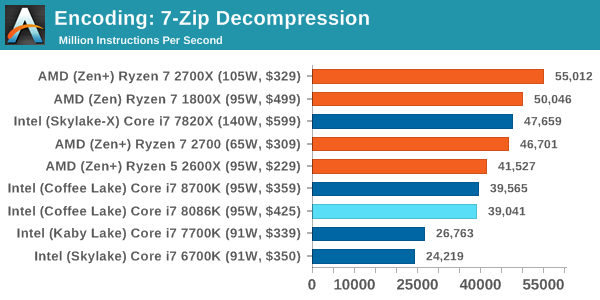
Again, trading blows with the 8700K, but falling behind a little bit.
WinRAR 5.40
For the 2017 test suite, we move to the latest version of WinRAR in our compression test. WinRAR in some quarters is more user friendly that 7-Zip, hence its inclusion. Rather than use a benchmark mode as we did with 7-Zip, here we take a set of files representative of a generic stack (33 video files in 1.37 GB, 2834 smaller website files in 370 folders in 150 MB) of compressible and incompressible formats. The results shown are the time taken to encode the file. Due to DRAM caching, we run the test 10 times and take the average of the last five runs when the benchmark is in a steady state.
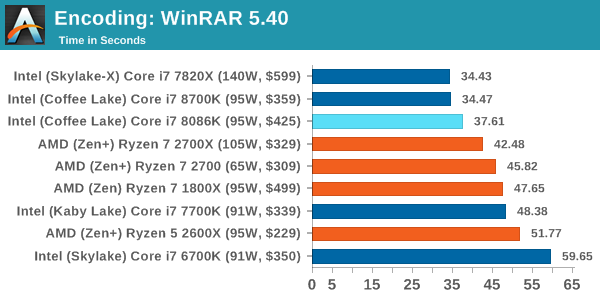
The 8086K takes another benchmark sitting behind the 8700K.
AES Encoding
Algorithms using AES coding have spread far and wide as a ubiquitous tool for encryption. Again, this is another CPU limited test, and modern CPUs have special AES pathways to accelerate their performance. We often see scaling in both frequency and cores with this benchmark. We use the latest version of TrueCrypt and run its benchmark mode over 1GB of in-DRAM data. Results shown are the GB/s average of encryption and decryption.
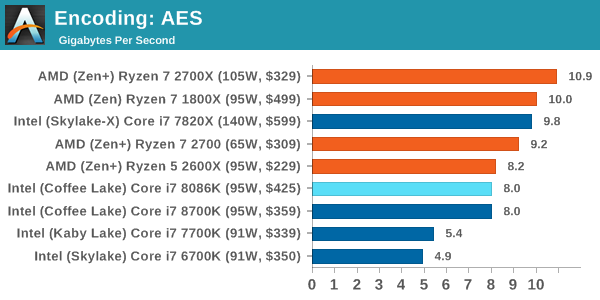
Under AES encoding we get literally identical results.
HandBrake v1.0.2 H264 and HEVC: link
As mentioned above, video transcoding (both encode and decode) is a hot topic in performance metrics as more and more content is being created. First consideration is the standard in which the video is encoded, which can be lossless or lossy, trade performance for file-size, trade quality for file-size, or all of the above can increase encoding rates to help accelerate decoding rates. Alongside Google's favorite codec, VP9, there are two others that are taking hold: H264, the older codec, is practically everywhere and is designed to be optimized for 1080p video, and HEVC (or H265) that is aimed to provide the same quality as H264 but at a lower file-size (or better quality for the same size). HEVC is important as 4K is streamed over the air, meaning less bits need to be transferred for the same quality content.
Handbrake is a favored tool for transcoding, and so our test regime takes care of three areas.
Low Quality/Resolution H264: Here we transcode a 640x266 H264 rip of a 2 hour film, and change the encoding from Main profile to High profile, using the very-fast preset.
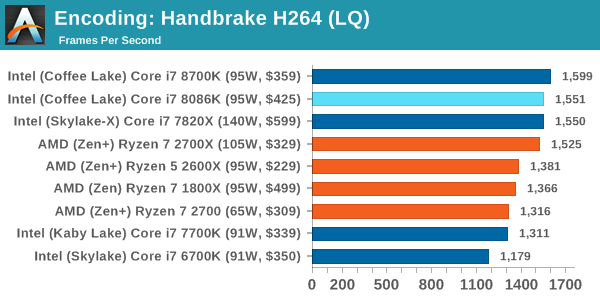
High Quality/Resolution H264: A similar test, but this time we take a ten-minute double 4K (3840x4320) file running at 60 Hz and transcode from Main to High, using the very-fast preset.
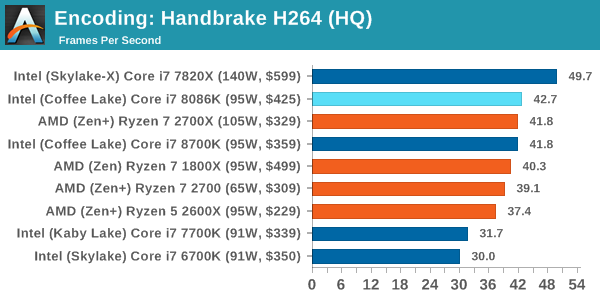
HEVC Test: Using the same video in HQ, we change the resolution and codec of the original video from 4K60 in H264 into 4K60 HEVC.
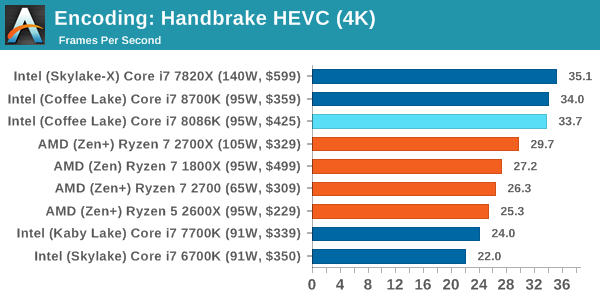










111 Comments
View All Comments
mkaibear - Tuesday, June 12, 2018 - link
"Total flop"I suggest benchmarking the CPU in your phone against this CPU and try again.
SanX - Tuesday, June 12, 2018 - link
They mostly serve different purposes and apps and have different TDP. But if you restrict consumption power of Intel processors to the same one of mobile processors then in the same apps it's not clear in advance which one will win.Time for ARM to look at the server and supercomputers markets.
iranterres - Monday, June 11, 2018 - link
HAHA. Intel once again trying to fool some people and appeasing the fanboys with something worthless and expensive.xchaotic - Tuesday, June 12, 2018 - link
So are the regular i7-8600K unable to run all core 5GHz? If so, what't the max stable freq for a non-binned i7-8600K? Personally I went for an even lower/cheaper i5-8400 CPU, but I see why some people prefer to be running max speed all the time...Rudde - Tuesday, June 12, 2018 - link
I assume you mean the i7-8700k.There is a phenomenon called 'the silicon lottery.' Basically, when you buy an i7-8700k, you can't know the max stable frequency. It could max out at 5.2GHz or it could only reach 4.7GHz before going unstable. The thing is, you can't know what you'll end up with.
This brings us to the i7-8068k. The i7-8068k is pretty much guaranteed to have a max stable frequency above 5GHz. Of course, this matters only when overclocking.
Bradyb00 - Tuesday, June 12, 2018 - link
Is it a lower temp than a 8700k for a given multiplier though? i.e. both 8700k and 8086k at 46x which is cooler? 8700k obviously has to be averaged as not everyone is lucky with the silicon lottery.Presumption is the 8086k will run cooler on average due to the better binning.
In which case I'm happy to pay more to save some degrees in my wee itx build
Lolimaster - Tuesday, June 12, 2018 - link
Why not simply pick the Ryzen 5 2600, same thing with actual lower temps from using high quality solder...$189
TheinsanegamerN - Monday, June 18, 2018 - link
Depends on the use case. For pure gaming, I'd stick with intel, which is a bit faster now and, if history is any indication, will hold up a LOT better for gaming in 5 years then the AMD chip will.Especially if you run games or emulators dependent on IPC (like PCSX2) the intel chip will perform a lot better then the AMD chip.
There is also the memory controller. Ryzen 2000 improved, but intel's controller is still superior, and that matters for things like RTS games that consume memory bandwidth like black holes consume stars.
Stuka87 - Tuesday, June 12, 2018 - link
Props to Asrock for providing the system so that you could get us stuff so quickly Ian. Not sure why everybody is complaining about the system and cooling that was used. The system was loaned to you so that you could get us numbers fast, which personally I am happy about. Thanks for your hard work Ian!El Sama - Tuesday, June 12, 2018 - link
This is quite the premium cost for a small increase in frequency that should be close to what you get to a 8700k OCed, an interesting offering regardless.